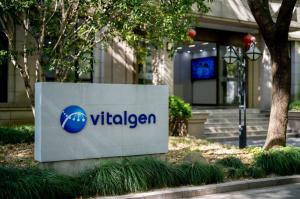Vitalgen’s Gene Therapy Drug VGN-R09b for Primary Parkinson’s Disease Receives FDA Fast Track Designation
VGN-R09b received IND approvals in China and the US in 2024, as a first-in-class recombinant adeno-associated virus (rAAV) gene therapy that targets two key pathways for the treatment of Parkinson's Disease (PD). The Phase I/II clinical trials have been ongoing in China since September, 2024, with all six patients dosed in the Phase I dose-escalation study. Safety data shows that the product is well-tolerated with no findings of VGN-R09b-related adverse events. Preliminary efficacy readouts show that VGN-R09b has a rapid onset of action, with significant gait improvements within two weeks post-treatment. The MDS-UPDRS Part III OFF scores decreased significantly after one month, with an average of 25-point improvements (approximately 50% improvements from the baseline) at six months. Overall, the Hoehn-Yahr (H-Y) scores progressively decreased, along with a reduction in oral medication dosages.
The FTD indicates FDA’s recognition of the clinical potential of VGN-R09b, marking an important milestone for Vitalgen’s expansion into the chronic disease area, and it also represents a global breakthrough for a Chinese gene therapy company in the neurodegenerative field. Together with its FDA IND approval in July 2024, this FTD further validates VGN-R09b’s global development potential and will provide expedited support for its future US clinical trials and regulatory filings.
About Fast Track Designation (FTD)
FTD is an FDA program designed to accelerate the development and approval of drugs that treat serious or life-threatening conditions and have the potential to address unmet medical needs. According to the performance report from the FDA's Center for Biologics Evaluation and Research (CBER), over 800 products have applied for FTD, with a success rate of approximately 68%. After receiving FTD, applicants are given the opportunity for frequent discussions with the FDA regarding their drug development plans, thereby increasing development efficiency. If the product meets certain criteria, it can qualify for accelerated approval, priority review, and rolling reviews, which can further accelerate development and market approval processes.
About Parkinson’s Disease (PD)
Parkinson’s Disease (PD) is the second most common neurodegenerative disease, with fast-growing incidences. It is projected that the global PD patient numbers will increase to more than 25 million by 2050. Current PD treatments are primarily small-molecule drugs for symptom relief. As the disease progresses, patients gradually lose response to oral medication, and significant motor complications persist despite fine-tuning the treatment regimens. There is currently no available treatment to delay disease progression or improve long-term outcomes.
a: Projections for prevalence of Parkinson’s disease and its driving factors in 195 countries and territories to 2050: modeling study of Global Burden of Disease Study 2021. BMJ. 2025;388:e080952. doi:10.1136/bmj-2024-080952.
About Vitalgen
Vitalgen was founded in March 2020 as a cell and gene therapy (CGT) company based in Shanghai, China, dedicated to translating cutting-edge CGT technologies into clinically accessible treatments for patients worldwide.
With proprietary intellectual property rights covering three core CGT platforms: ViVec® (AAV manufacturing platform), ViCas® (CRISPR gene-editing platform) and ViLNP® (Lipid nanoparticle delivery platform), Vitalgen has developed a diversified portfolio of innovative CGTs targeting CNS diseases, ophthalmic conditions, metabolic and hematologic disorders, and oncology, including multiple potential First-in-Class (FIC) products.
Up-to-date, Vitalgen has received multiple rounds of investment from renowned venture funds and has established CGT R&D labs and operational centers in the Zhangjiang High-tech Park and a GMP commercial production facility in the Waigaoqiao Free Trade Zone, Shanghai, China.
David Wu
Vitalgen BioPharma
email us here
Legal Disclaimer:
EIN Presswire provides this news content "as is" without warranty of any kind. We do not accept any responsibility or liability for the accuracy, content, images, videos, licenses, completeness, legality, or reliability of the information contained in this article. If you have any complaints or copyright issues related to this article, kindly contact the author above.
NewSky Security Expands into Cyber Security Private Investigations to Combat Sophisticated Botnet and VPN Threats
CTO G. Vimal Kumar of Cyber Privilege Honored for Advancing Cyber Forensics and Digital Evidence in India
Breaking Barriers: Puerto Rican Chess Enthusiast Alex Martinez Makes History at Serbian Chess Open
Kalendarium
Więcej ważnych informacji
 Jedynka Newserii
Jedynka Newserii

 Jedynka Newserii
Jedynka Newserii

Prawo

KE proponuje nowy Fundusz Konkurencyjności. Ma pobudzić inwestycje w strategiczne dla Europy technologie
W środę 16 lipca Komisja Europejska przedstawiła projekt budżetu na lata 2028–2034. Jedna z propozycji zakłada utworzenie Europejskiego Funduszu Konkurencyjności o wartości ponad 400 mld euro, który ma pobudzić inwestycje w technologie strategiczne dla jednolitego rynku. Wśród wspieranych obszarów znalazła się obronność i przestrzeń kosmiczna. Na ten cel ma trafić ponad 130 mld euro, pięciokrotnie więcej niż do tej pory.
Firma
Były prezes PGE: OZE potrzebuje wsparcia magazynów energii. To temat traktowany po macoszemu

Choć udział odnawialnych źródeł energii w miksie energetycznym Polski jest stosunkowo wysoki i rośnie, to ten przyrost jest chaotyczny i nierównomiernie rozłożony miedzy technologiami – wskazuje Forum Energii. Dodatkowo OZE potrzebują wsparcia magazynów energii, a zdaniem Wojciecha Dąbrowskiego, prezesa Fundacji SET, ten temat jest traktowany po macoszemu. Brak magazynów powoduje, że produkcja energii z OZE jest tymczasowo wyłączana, co oznacza marnowanie potencjału tych źródeł.
Infrastruktura
Wzrost wynagrodzeń ekip budowlanych najmocniej wpływa na koszty budowy domu. Zainteresowanie inwestorów mimo to nieznacznie wzrasta

Budowa metra kwadratowego domu w Polsce kosztuje od 5,55 do 6 tys. zł w zależności od województwa – wynika z najnowszych analiz firmy Sekocenbud. Najdrożej jest w Warszawie, gdzie cena za metr kwadratowy domu przekroczyła już 6,2 tys. zł. Na przyrosty kosztów budowy domu wpływają zarówno drożejące materiały budowlane, jak i wyższe wynagrodzenia pracowników. Inwestorzy nie rezygnują jednak z budowy domów jednorodzinnych, co ma związek m.in. z wciąż wysokimi cenami mieszkań czy też obniżką stóp procentowych.
Partner serwisu
Szkolenia

Akademia Newserii
Akademia Newserii to projekt, w ramach którego najlepsi polscy dziennikarze biznesowi, giełdowi oraz lifestylowi, a także szkoleniowcy z wieloletnim doświadczeniem dzielą się swoją wiedzą nt. pracy z mediami.









.gif)

 |
| |
| |
|